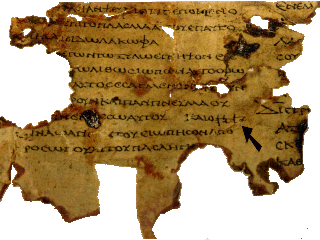Related Research Articles

The Bible is a collection of religious texts, writings, or scriptures sacred in Christianity, Judaism, Samaritanism, Islam, Rastafari, and many other faiths. It appears in the form of an anthology, a compilation of texts of a variety of forms that are all linked by the belief that they are collectively revelations of God. These texts include theologically-focused historical accounts, hymns, prayers, proverbs, parables, didactic letters, admonitions, essays, poetry, and prophecies. Believers also generally consider the Bible to be a product of divine inspiration.

The deuterocanonical books are books and passages considered by the Catholic Church, the Eastern Orthodox Church, the Oriental Orthodox Churches and the Assyrian Church of the East to be canonical books of the Old Testament, but that Protestant denominations do not regard as part of the biblical canon. They date from 300 BC–AD 100, mostly from 200 BC–AD 70, before the definite separation of the Christian church from Judaism. While the New Testament never directly quotes from or names these books, the apostles most frequently used and quoted the Septuagint, which includes them. Some say there is a correspondence of thought, and others see texts from these books being paraphrased, referred or alluded to many times in the New Testament, particularly in the Pauline epistles, depending in large measure on what is counted as a reference.

The Old Testament is the first division of the Christian biblical canon, which is based primarily upon the 24 books of the Hebrew Bible or Tanakh, a collection of ancient religious Hebrew writings by the Israelites. The second division of Christian Bibles is the New Testament, written in the Koine Greek language.

The Greek Old Testament, or Septuagint, is the earliest extant Koine Greek translation of books from the Hebrew Bible and deuterocanonical books. The first five books of the Hebrew Bible, known as the Torah or the Pentateuch, were translated in the mid-3rd century BC. The remaining books of the Greek Old Testament are presumably translations of the 2nd century BC.

The Hebrew Bible or Tanakh, is the canonical collection of Hebrew scriptures, including the Torah, the Nevi'im, and the Ketuvim. These texts are almost exclusively in Biblical Hebrew, with a few passages in Biblical Aramaic.

The Samaritan Pentateuch, also known as the Samaritan Torah, is a text of the first five books of the Hebrew Bible, written in the Samaritan script and used as sacred scripture by the Samaritans. It dates back to one of the ancient versions of the Hebrew Bible that existed during the Second Temple period, and constitutes their entire biblical canon.

The Bible has been translated into many languages from the biblical languages of Hebrew, Aramaic and Greek. As of September 2020 the full Bible has been translated into 704 languages, the New Testament has been translated into an additional 1,551 languages and Bible portions or stories into 1,160 other languages. Thus at least some portions of the Bible have been translated into 3,415 languages.

Eber is an ancestor of the Ishmaelites and the Israelites according to the "Table of Nations" in the Book of Genesis and the Books of Chronicles.
Emanuel Tov, is an Israeli, emeritus J. L. Magnes Professor of Bible Studies in the Department of Bible at the Hebrew University of Jerusalem. He has been intimately involved with the Dead Sea Scrolls for many decades, and from 1991, he was appointed Editor-in-Chief of the Dead Sea Scrolls Publication Project.
In contrast to the variety of absolute or personal names of God in the Old Testament, the New Testament uses only two, according to the International Standard Bible Encyclopaedia.

The Tetragrammaton or Tetragram is the four-letter Hebrew word יהוה, the name of the national god of Israel. The four letters, read from right to left, are yodh, he, waw, and he. While there is no consensus about the structure and etymology of the name, the form Yahweh is now accepted almost universally.

The Old Testament is the first section of the two-part Christian biblical canon; the second section is the New Testament. The Old Testament includes the books of the Hebrew Bible (Tanakh) or protocanon, and in various Christian denominations also includes deuterocanonical books. Orthodox Christians, Catholics and Protestants use different canons, which differ with respect to the texts that are included in the Old Testament.

There is no scholarly consensus as to when the Hebrew Bible canon was fixed. Some scholars argue that it was fixed by the Hasmonean dynasty, while others argue it was not fixed until the second century CE or even later.

Biblical languages are any of the languages employed in the original writings of the Bible. Partially owing to the significance of the Bible in society, Biblical languages are studied more widely than many other dead languages. Furthermore, some debates exist as to which language is the original language of a particular passage, and about whether a term has been properly translated from an ancient language into modern editions of the Bible. Scholars generally recognize three languages as original biblical languages: Hebrew, Aramaic, and Koine Greek.

The Septuagint (LXX), the ancient Alexandrian translation of Jewish scriptures into Koine Greek exists in various manuscript versions.

A biblical canon, also called canon of scripture, is a set of texts which a particular Jewish or Christian religious community regards as authoritative scripture. The English word canon comes from the Greek κανών, meaning "rule" or "measuring stick". Christians were the first to use the term in reference to scripture, but Eugene Ulrich regards the notion as Jewish.
While the Old Testament portion of the Bible was written in Hebrew, the New Testament was originally written in Koine Greek. The Greek language, however, has several different dialects or denominations. This required several different translations done by several different individuals and groups of people. These translations can be categorized into translations done before and after 1500 AD.
The New Testament was written in a form of Koine Greek, which was the common language of the Eastern Mediterranean from the conquests of Alexander the Great until the evolution of Byzantine Greek.
Koine Greek, also known as Alexandrian dialect, common Attic, Hellenistic or Biblical Greek, was the common supra-regional form of Greek spoken and written during the Hellenistic period, the Roman Empire and the early Byzantine Empire. It evolved from the spread of Greek following the conquests of Alexander the Great in the fourth century BC, and served as the lingua franca of much of the Mediterranean region and the Middle East during the following centuries. It was based mainly on Attic and related Ionic speech forms, with various admixtures brought about through dialect levelling with other varieties.
Jewish Koine Greek, or Jewish Hellenistic Greek, is the variety of Koine Greek or "common Attic" found in a number of Alexandrian dialect texts of Hellenistic Judaism, most notably in the Septuagint translation of the Hebrew Bible and associated literature, as well as in Greek Jewish texts from Palestine. The term is largely equivalent with Greek of the Septuagint as a cultural and literary rather than a linguistic category. The minor syntax and vocabulary variations in the Koine Greek of Jewish authors are not as linguistically distinctive as the later language Yevanic, or Judeo-Greek, spoken by the Romaniote Jews in Greece.
References
- ↑ The translators used a form of Koine Greek.
- ↑ Thus books – or parts of books – that are not contained in the Hebrew Bible are not part of the Old Greek, even though they were eventually considered part of the Septuagint.
- ↑ "As early as the second century A.D., "Septuagint" was used as an umbrella term for the Christian collection[s] of Jewish scriptures […] This convenient but potentially misleading use of the term still prevails […] Since there is no homogeneity among the various translation units of this collection […], it is more accurate to speak of the oldest recoverable Greek form of each section/book (OG="Old Greek"), which in the Pentateuch is the LXX proper." Kraft, Robert A. (1976). "B. Earlier Greek versions ("Old Greek")". In Crim, Keith (ed.). The Interpreter's Dictionary of the Bible. Supplementary Volume . Abingdon Press. p. 811. ISBN 9780687192694.
"It is probably better to refer to the original translation of books other than the Pentateuch as the Old Greek (OG) so as to distinguish them from the original translation of the Pentateuch and from the later revisions and new translations. (when referring to these initial translations of the Hebrew Bible as a whole, some scholars prefer the combined abbreviation "LXX/OG" as a continual reminder of the diversity that characterizes the corpus.) Jobes, Karen H. & Silva, Moisés (2000). Invitation to the Septuagint. Paternoster Press / Baker Academic. p. 32. ISBN 1-84227-061-3.